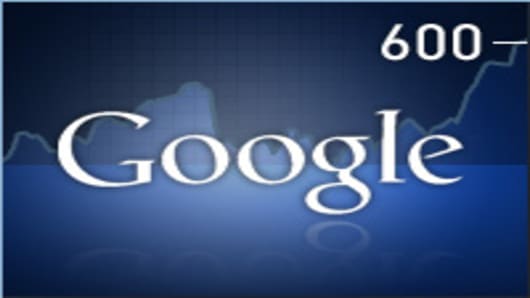So close, but so far yesterday, and now it appears investors will have to wait a little longer for Google to hit that magic, $600 a share milestone. This isn't quite "Dow 10,000," but the numbers are nothing short of staggering. I'll run through them a little before asking the more important question of how long can this breathless performance continue?
Google is approaching $200 billion in market cap; not bad for a company publicly traded for only the past 3 years. Shares are up nearly 45% over the past year; 12% this month alone; Google has added something like $4 billion in market cap just this past week. The Google guys cracked the Forbes Top 5. They personally own a Boeing 767.
It's good to be Google.
The biggest knock on this company is that pesky "Law of Large Numbers:" The bigger the company gets, the more it needs to do to keep up its monumental growth rate. In other words, it was a lot easier going from $500 million to that first $1 billion. It's a lot harder going from $10 billion to $20 billion. Another knock: the more Google grows, the more pressure its profit margins suffer. Remember that last quarter the company stunned the Street with a dip in operating margins because it had the audacity to hire 1,500 new workers. So Google is actually growing faster than analysts anticipated and that's "bad news?"
Believe me, I get the whole margin-squeeze thing as not being the kind of news investors want to hear. But this didn't happen because of a contraction in business. It didn't happen because paid search is drying up. It didn't happen because Google was forced to lower prices due to unforeseen competition from rival Yahoo . All those things may happen some day; it's just that they aren't happening yet.
There are some uncertainties out there: this newfound focus by the Feds into Google's growth strategy, especially as it relates to the DoubleClick deal; uncertainty about whether Viacom's copyright suit against YouTube will yield any meaningful damages; ongoing concerns about that margin squeeze; advertising slowdowns; hiring binges; entering the cell phone market with a branded handset of its own.
But harken back to the fundamentals, study up on Google's P/E, which still sits at a very affordable 31x next year's earnings, and watch the continued stumbling by the likes of Yahoo (though its new search engine and monetization algorhythm are pretty compelling) and Microsoft (which may be forced to spend some enormous amount of money on a paltry stake in Facebook to offer up the illusion of a competitive strategy for Google), and Google still seems cheap.
Steve Weinstein at Pacific Crest Securities said it best on CNBC this morning: "I think Google has tremendous opportunity in front of them. The search engine business? They still have dominance here in the U.S. and the rest of the world. I do think they are going to close this DoubleClick deal later this year. I think that's going to open up the entire display ad market for them. We've seen them doing enterprise application. I think it's in a very early stage for this company, probably the best growth story in the industry, and I think stick with it."
And consider this: several analysts maintain their at or near $600 targets for Google even as other companies enjoying similar momentum like Apple and Research in Motion have seen their targets constantly revised upward to account for the enormous growth they've enjoyed. Does this mean Google has peaked? Hardly. Analysts are likely waiting earnings and Google tea leaves when the company reports on October 18. If the company disappoints like it did last quarter, stocks may take a hit but not the big one it would suffer if analysts started raising targets right now. If the company beats, shares will soar.
Which means investors may be looking at $600 a share in their rear view mirror, heeding that rear-view mirror warning: "Objects in mirror are bigger than they appear." Meaning $600 a share might seem big, but these shares could be substantially larger than that.


